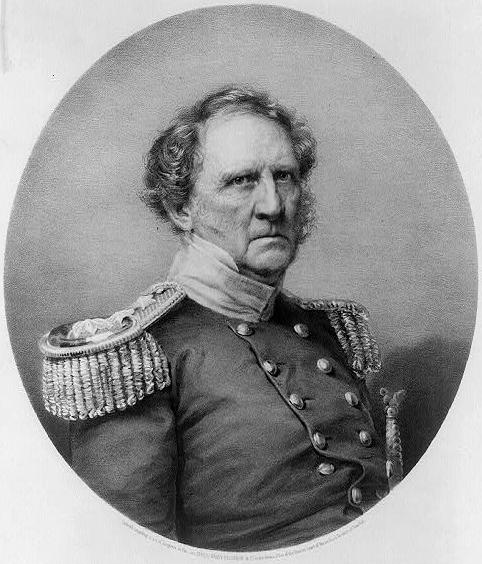Scott Tattoo on:
[Wikipedia]
[Google]
[Amazon]
"Scott Tattoo" is a
 The call was published in musical notation in an American military manual written by Major General
The call was published in musical notation in an American military manual written by Major General
/ref> "Tattoo" is derived from ''doe den tap toe'', Dutch for "turn off the taps".Finneran, Col. Thomas J. "Customs, traditions of remembrance", Air Combat Command, December 20, 2010
/ref> "The "Scott Tattoo" was general bugle call used to notify soldiers to cease the evening's drinking and return to their garrisons.
 " Taps" was composed by General
" Taps" was composed by General
/ref> Butterfield's music traces its origin to the "Scott Tattoo". A half-tempo modification of the last five and a quarter bars of the "Scott Tattoo" creates the call we now know as "Taps."
tapsbugler.com
/ref> Later in the war, Taps would be played at burials in lieu of the three volleys of rifle fire since it was thought the sound of the gunshots might be mistaken for enemy fire.
"L'Extinction des Feux"
"The Scott Tattoo"
Military life 1862 songs Songs of the American Civil War American patriotic songs Union Army Acknowledgements of death
bugle
The bugle is one of the simplest brass instruments, normally having no valves or other pitch-altering devices. All pitch control is done by varying the player's embouchure.
History
The bugle developed from early musical or communication ...
call entitled "The Tattoo" first published in 1835, and thought to be the source of the bugle call known as " Taps".
History
 The call was published in musical notation in an American military manual written by Major General
The call was published in musical notation in an American military manual written by Major General Winfield Scott
Winfield Scott (June 13, 1786May 29, 1866) was an American military commander and political candidate. He served as a general in the United States Army from 1814 to 1861, taking part in the War of 1812, the Mexican–American War, the early s ...
, first published in 1835. The term "Scott Tattoo" was coined by Russell H. Booth in his 1977 magazine article ''Butterfield and "Taps"'' which first set forth the discovery of this earlier form of the essential Taps melody. In military manuals of the 19th century there were multiple versions of bugle calls named "Tattoo," so the term "Scott Tattoo" was needed to identify the particular version of Tattoo from which "Taps" arose. It is speculated that the "Scott Tattoo" itself may have come from earlier calls or earlier publications yet to be discovered.
Bugles served as the command, control and communications systems of the day.Lagan, Christopher. "Volunteer buglers honor veterans through 'Taps'", ''All Hands'', United States Coast Guard/ref> "Tattoo" is derived from ''doe den tap toe'', Dutch for "turn off the taps".Finneran, Col. Thomas J. "Customs, traditions of remembrance", Air Combat Command, December 20, 2010
/ref> "The "Scott Tattoo" was general bugle call used to notify soldiers to cease the evening's drinking and return to their garrisons.
"Taps"
 " Taps" was composed by General
" Taps" was composed by General Daniel Butterfield
Daniel Adams Butterfield (October 31, 1831 – July 17, 1901) was a New York businessman, a Union general in the American Civil War, and Assistant Treasurer of the United States.
After working for American Express, co-founded by his father, ...
during the American Civil War
The American Civil War (April 12, 1861 – May 26, 1865; also known by other names) was a civil war in the United States. It was fought between the Union ("the North") and the Confederacy ("the South"), the latter formed by states ...
. In July 1862, the Army of the Potomac was encamped at Harrisons Landing on the James River in Virginia following the Seven Days Battle. "Taps" began as general bugle call to replace a previous “Tattoo” — a lengthy, brisk combination of the French bugle call "To Extinguish Lights" and the British call “Last Post.” Tattoo was sounded for lights out to close the soldier's day in the mid 1800s. General Butterfield felt Tattoo was too formal to signal the day's end."The Origin of 'Taps'", The United States Army Band/ref> Butterfield's music traces its origin to the "Scott Tattoo". A half-tempo modification of the last five and a quarter bars of the "Scott Tattoo" creates the call we now know as "Taps."
tapsbugler.com
/ref> Later in the war, Taps would be played at burials in lieu of the three volleys of rifle fire since it was thought the sound of the gunshots might be mistaken for enemy fire.
References
{{reflist * Booth, Russell H., ''Butterfield and "Taps"''. Civil War Times, December 1977, pp. 35–39. * Scott, Major-General Winfield, ''Infantry Tactics''. 1835.External links
"L'Extinction des Feux"
"The Scott Tattoo"
Military life 1862 songs Songs of the American Civil War American patriotic songs Union Army Acknowledgements of death